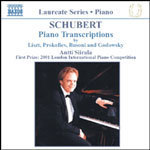
Schubert: Piano Transcriptions (by Godowsky, Liszt, Prokofiev & Busoni)
 $25.00
Out of Stock
$25.00
Out of Stock6+ weeks add to cart
FRANZ SCHUBERT
Schubert: Piano Transcriptions (by Godowsky, Liszt, Prokofiev & Busoni)
Antti Siirala (piano)
[ Naxos Laureate Series / CD ]
Release Date: Thursday 7 August 2003
This item is currently out of stock. It may take 6 or more weeks to obtain from when you place your order as this is a specialist product.
"A disc débutant takes on a challenging programme and passes with flying colours"
- Editor's Choice gramophone Magazine (August 2003)
"Antii Siirala won the International Piano Competition in 2000 aged 20 - his performance of Brahms's colossal First Piano Concerto with the LPO was enough to convince the jury of his considerable talent (and courage!). This is disc on a somewhat more modest scale though some of these transcriptions of Schubert songs take on almost orchestral proportions. This recording was part of the prize for that London competition and credit is due to Naxos for that initiative"
- Editor's Choice gramophone Magazine (August 2003)
"More to the point are Siirala's performances, which are masterly and warmly sympathetic throughout, and never more so than in Godowsky's horrendously demanding Passacaglia on Schubert's Unfinished Symphony. Even Horowitz balked before this challenge, complaining that you needed six hands to encompass such fearsome difficulties. Not so Siirala, who manages superbly with two, his musical breadth and assurance making you concentrate on qualities above and beyond Godowsky's virtuoso achievement...All Siirala's performances are of a special freshness and distinction. Heard in Naxos's impressive sound, he makes you look forward to further discs in the widest repertoire."
- Bryce Morrison, Gramophone, August 2003
One of the great players of his time, the Polish-American pianist Leopold Godowsky was born in Lithuania in 1870. The first signs of his exceptional musical ability were clear by the age of three and he wrote his first compositions four years later, in 1879 making his first public appearance as a pianist. There followed a series of concerts in Germany and Poland and, in 1884, his first appearance in the United States in Boston. In 1886, hoping to study with Liszt, he returned to Europe, but, learning of the latter's death from a newspaper, he travelled, instead, to Paris, with the object of studying with Camille Saint-Saëns, distinguished equally as a pianist and a composer. Saint-Saëns was impressed by Godowsky's playing and suggested that he should adopt him, on condition that he changed his name, a proposal that Godowsky rejected. For some three years, however, their relationship continued. The contact was a valuable one and allowed Godowsky to meet leading figures in contemporary musical life. In 1890 he returned to America, where he taught and continued his career as a performer. Ten years later he settled in Berlin, his base for concert tours throughout Europe and the Near East. In 1909 he moved to Vienna to direct the piano master-class at the Akademie der Tonkunst. There were American tours between 1912 and 1914 and with the outbreak of war Godowsky settled again in the United States, giving concerts and clarifying his innovative theories of keyboard technique in a series of editions and publications. At the same time he continued to write music of his own for the piano. He gave his last concert in the United States in 1922, but continued to tour throughout the world, acknowledged as one of the leading virtuosi of his time. His career as a performer was curtailed by a stroke in 1930, and until his death in 1938 he was unable to play. He now increasingly pinned his hopes for a lasting place in the history of music on his compositions and transcriptions for the piano, an ambition largely unrealised. Following tradition, Godowsky included in his repertoire transcriptions of varying degrees of elaboration. Gute Nacht (Good night) is a transcription of the first song of Winterreise, setting the sombre tone of the work, as the protagonist departs in the night, leaving his beloved to sleep. The song is presented first in simple form, gradually further elaborated, as further elements are added, without destroying the prevailing mood. Morgengruss (Morning greeting) is from the earlier Schubert cycle Die schöne Müllerin (The Maid of the Mill) and is treated with greater elaboration. The young miller greets his master's daughter, who turns her head away. The last work by Godowsky here included is of another kind, an original composition rather than a transcription, a Passacaglia based on the first eight bars of Schubert's Unfinished Symphony. Written in 1928 to mark the hundredth anniversary of Schubert's death, the Passacaglia consists of 44 variations, a cadenza and a fugue, a work calling for supreme virtuosity in performance.
Tracks:
Winterreise (transcribed by Godowsky)
01. Gute Nacht 06:45
Der Lindenbaum (transcribed by Liszt)
02. Der Lindenbaum 04:53
Winterreise (transcribed by Liszt)
03. Der sturmische Morgen - Im Dorfe 05:59
Waltzes (transcribed by Prokofiev)
04. Waltzes 08:59
Die Schone Mullerin (transcribed by Godowsky)
05. Morgengruss 04:23
Erlkonig (transcribed by Liszt)
06. Erlkonig 04:38
Overture in D (transcribed by Busoni)
07. Overture in D 07:49
LEOPOLD GODOWSKY
Passacaglia (*based on the first eight bars of Schubert's Unfinished Symphony)
08. Passacaglia 19:30



